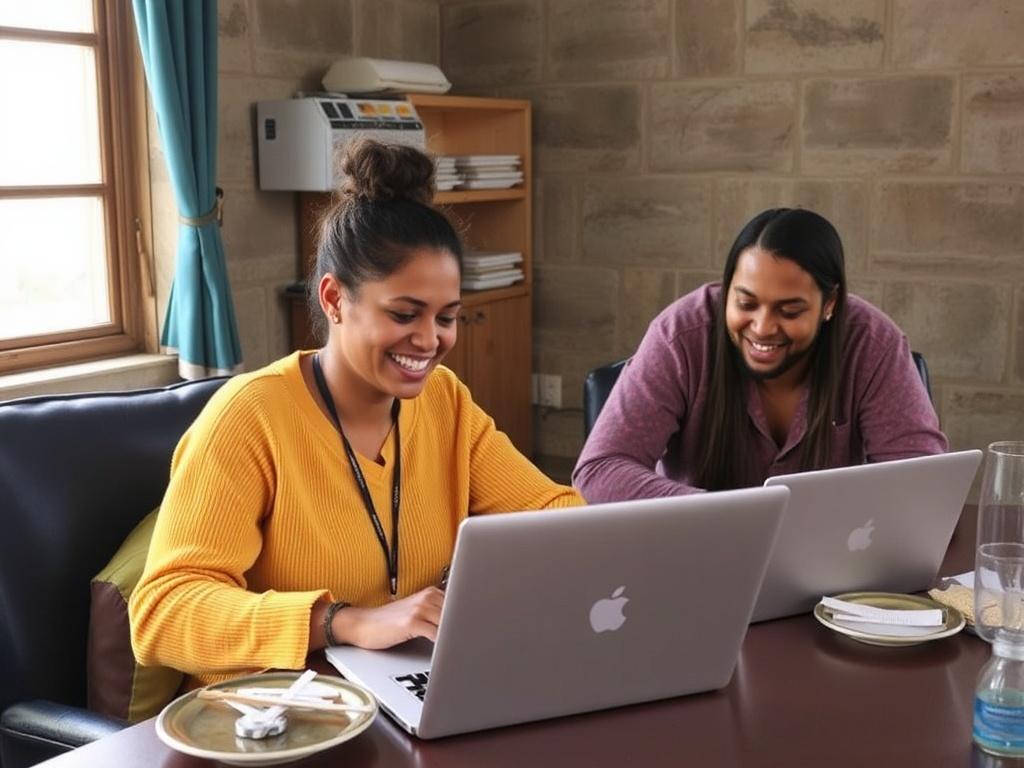Traveling while earning a living is no longer a far-fetched dream reserved for a select few. Whether you picture yourself typing away on a laptop in a seaside café, teaching English in a mountain village, or trading a few hours of volunteer work for room and board, the possibilities are vast and exciting. In this article, we’ll explore how to trabajar mientras viajas — the realities, the trade-offs, and the concrete steps you can take to make it happen. I’ll walk you through opciones remotas and voluntariados in a conversational, down-to-earth way so you can envision a path that actually fits your life.
If you’re reading this, you probably have a mix of curiosity and a little anxiety: can I really be productive on the road? Will volunteering mean I lose income? How do visas, taxes, and logistics work when your life is split between countries? These are normal questions. Over many paragraphs ahead, we’ll break these topics into manageable pieces, give you the tools and checklists you need, and show examples so that trabajar mientras viajas doesn’t remain an abstract idea but becomes something you can plan for and enjoy.
I’ll use plain language and give practical scenarios — because the best advice is the advice you can act on. We’ll cover remote work options like freelancing, contract programming, teaching online, and location-independent jobs, and then contrast them with voluntariados options such as eco-volunteering, community teaching, or WWOOF-style farm stays. There will be real-world tips about productivity, finances, gear, safety, and how to handle legalities like visas and taxes. Ready? Let’s jump in.
Why work while you travel? The appeal and the trade-offs
There’s a romantic streak to the idea of working from a beach bungalow or a cobbled European cafe — but beyond romanticism, there are practical reasons people choose to trabajar mientras viajas. First, working remotely can stretch your budget: lower-cost countries can make your money go further, giving you a higher quality of life without sacrificing income. Second, it provides structure: instead of returning home and worrying about wiping out savings, you can travel sustainably over months or years. Third, it can be incredibly enriching. You meet new people, expand your cultural horizons, and often gain fresh perspectives that influence your work.
That said, there are trade-offs. Time zones can be a headache, especially if clients are in significantly different regions. Loneliness can surface — moving cities frequently means relationships can be transient. There’s also the question of reliability: internet connections and power stability aren’t guaranteed everywhere, and that can affect deadlines and deliverables. Voluntariados, on the other hand, often provide accommodation and food in exchange for work, which can reduce expenses and offer deep local immersion. But volunteering often doesn’t pay, and sometimes it requires physical labor or responsibilities that don’t match everyone’s skills.
Thinking through these trade-offs early will help you choose between opciones remotas or voluntariados, or decide on a hybrid approach where you alternate between remote-paying work and volunteering stints. Many people find a blended life — a month of freelance work followed by a volunteer project — gives both financial stability and meaningful travel experiences.
Types of remote work (opciones remotas) that fit travelers
Remote work has blossomed into many forms. Below are several widely accessible opciones remotas that frequent travelers use, along with a snapshot of what each entails.
Freelancing and consulting
Freelancing is one of the most flexible ways to trabajar mientras viajas. Whether you’re a writer, designer, marketer, translator, or consultant, freelancing allows you to pick projects, set your hours, and often work asynchronously. Platforms like Upwork, Fiverr, and specialized industry networks can help you find clients. The challenge lies in building a reputation and smoothing income fluctuations — but with repeat clients and a steady pipeline, freelancing can be a sustainable, location-independent income.
Remote full-time jobs
More companies offer full-time remote roles that support a stable salary and benefits. Many tech companies, startups, and even traditional firms have embraced remote work. Full-time remote roles usually require fixed hours or overlap windows for meetings, which can limit extreme mobility but still allow you to move between cities while maintaining a consistent paycheck.
Teaching online
Teaching English or other subjects online is a popular option for travelers. Platforms such as VIPKid, iTalki, and Preply connect tutors with students worldwide. Requirements vary: some expect a degree or TEFL certification, while others just require subject expertise and a reliable internet connection. Teaching online can be scheduled flexibly and often pays per hour, making it a good fit for people who want predictable, steady income.
Digital products and passive income
Creating digital products — like courses, ebooks, templates, or photography — can create semi-passive income. It takes upfront work to build these products, but once they’re live, sales can keep coming in while you travel. This option is ideal for someone who wants to combine creative work with constant movement.
Remote gig platforms and microtasks
For quick, low-commitment earnings, microtask platforms and gig apps can help. Think transcription, simple data entry, or on-demand design tasks. These gigs are often lower paid but flexible and accessible immediately, which is helpful if you need short-term cash flow during travel.
Local gigs and seasonal work
If you’re open to settling temporarily in one place, consider local gigs like hospitality, bartending, or seasonal tourism jobs. They aren’t fully remote but can pair well with voluntariados and can provide local integration and steady cash in higher-tourism seasons.
Voluntariados: different forms of meaningful work abroad
Volunteering abroad is a popular way to travel with purpose. Voluntariados vary widely in commitment, cost, and impact. Here are common types and what each typically involves.
Community development and education
Teaching English, supporting local schools, or participating in literacy programs can be highly impactful. These roles often require patience, cultural sensitivity, and sometimes formal credentials (e.g., TEFL). The upside is deep human connections and tangible outcomes, but be mindful of programs that lack sustainability or proper oversight.
Conservation and eco-volunteering
If you love nature, eco-volunteering — protecting wildlife, reforestation, or marine conservation — might be appealing. Programs like beach cleanups, wildlife monitoring, and ecological research give hands-on experience. Some projects demand physical labor, and many require a small fee or donation for housing and logistics.
WWOOF and farm stays
WWOOF (World Wide Opportunities on Organic Farms) and similar programs connect travelers with farms where volunteers work in exchange for food and accommodation. It’s a great way to learn agricultural skills, live simply, and save money. These experiences can be physically intensive but deeply rewarding.
Humanitarian and disaster-response volunteering
These placements focus on urgent needs: disaster relief, refugee support, and public health interventions. They often require specific training and can be emotionally challenging. If you choose this path, ensure the organization is reputable and that your role is appropriate for your skills.
Skill-based volunteering
Many nonprofits need professional expertise — web development, accounting, legal advice, marketing, or program evaluation. Skill-based voluntariados can create high impact while allowing you to use your real professional talents. They can also build your resume and network.
Comparing opciones remotas and voluntariados: a practical table
Below is a simple table to help you compare remote paid work and voluntariados across important factors so you can decide what matches your priorities.
| Factor | Opções Remotas (Remote Paid Work) | Voluntariados |
|---|---|---|
| Income | Paid — can be variable but sustainable if steady contracts or full-time remote role | Usually unpaid; may include accommodation/food but not salary |
| Flexibility | High — depends on job; some roles require fixed hours | Varies — often structured around program needs and schedules |
| Impact | Indirect — economic benefits, personal growth | Direct — community benefit, environmental conservation |
| Skill Use | Professional skills applied to client needs | May use professional skills or involve manual work |
| Logistics | Requires stable internet, equipment, and time zone management | May include housing, sometimes remote locations with limited connectivity |
| Commitment | Short- to long-term depending on contracts | Short-term (weeks) to long-term (months/years) — often fixed start/end dates |
How to find remote work and volunteering opportunities while traveling
Finding the right role takes research and caution. Here are practical channels and tactics for discovering legitimate opciones remotas and voluntariados.
Online platforms and marketplaces
For remote paid work, start with established freelance marketplaces and remote job boards: Upwork, Freelancer, Toptal, Remote.co, We Work Remotely, and LinkedIn. For teaching, check VIPKid, Preply, and iTalki. For voluntariados, platforms like Volunteer World, Workaway, WWOOF, and Idealist list many opportunities, but always cross-check reviews and references.
Direct outreach and networking
Sometimes the best opportunities come from cold emailing NGOs, startups, or small businesses with a concise pitch and portfolio. Attend local meetups, join Facebook groups for digital nomads or expats, and use LinkedIn to connect with people doing the kind of work you want.
Local hostels, coworking spaces, and community boards
When you arrive in a place, look at hostel noticeboards, coworking space postings, and community centers. These often have local gigs, short-term contracts, or volunteer needs that aren’t advertised online.
Referrals and alumni networks
Talk to people who’ve done voluntariados or remote work before. Referrals can bypass scams and save you months of searching. Alumni networks of universities or former employers can also provide remote job leads.
Practical preparations: visas, taxes, and legal considerations
Working while traveling isn’t just an adventure — it’s also a legal and financial activity that requires careful planning. Let’s review key considerations.
Visas and legal permission to work
Many tourist visas prohibit paid work in-country, even if your client is abroad. Always check the visa rules for each country you plan to stay in. Some countries offer digital nomad visas or long-term remote work permits that explicitly allow remote work for foreign employers. Voluntariados sometimes fall into a gray area: some programs are allowed on tourist visas if they’re unpaid and short-term, but others require specific volunteer visas or permits. Ignoring local visa rules can lead to fines or deportation, so research or consult immigration experts when in doubt.
Taxes and residency
If you’re earning remotely, you need to understand tax obligations both in your home country and potentially where you stay. Many countries tax residents and sometimes non-residents who perform work within the country. If you maintain a tax home or a permanent address, you may have ongoing obligations. Consider consulting an international tax advisor, and keep detailed records of income, invoices, and travel dates.
Insurance and liability
Travel insurance that covers medical emergencies, evacuation, and theft is essential. If your remote work involves professional liability (e.g., consulting), consider whether you need business insurance. For voluntariados, confirm whether the organization provides liability coverage and health support, especially for physically demanding roles.
Gear, connectivity, and workspace setups
Being mobile doesn’t mean being under-equipped. The right tools and habits can help you stay productive and avoid last-minute panic.
Essential gear
A durable laptop, external battery pack, noise-canceling headphones, universal power adapter, portable SSD, and a lightweight backpack make life easier. If you teach online, get a quality webcam and a good microphone to improve the student experience. Backup solutions like cloud storage and encrypted local backups protect your work.
Connectivity strategies
Reliable internet is the lifeline for opciones remotas. Research accommodations that advertise high-speed Wi-Fi and layer in backups: a local SIM card with a data plan, a portable Wi-Fi hotspot, and knowledge of nearby coworking spaces or cafes with fast internet. Speedtest and local community groups can help you test connectivity before committing to a long stay.
Creating a mobile-friendly workspace
A consistent routine helps focus. Design a lightweight setup: a compact mouse, laptop stand, and a small notepad. Identify productive spots in each destination (coworking spaces, libraries, or quiet cafes). Many coworking spaces offer daily passes and are ideal for meeting other professionals and maintaining a routine.
Time management and productivity for the traveling worker

Distractions are everywhere when you travel — new sights, friends, and the tug of exploration. To balance work and travel, cultivate habits that help you sustain productivity without missing out.
Block scheduling and boundary-setting
Use block scheduling: assign chunks of time to deep work, meetings, and local exploration. Set clear boundaries with clients about your availability and time zone constraints. Communicate proactively to avoid last-minute meeting conflicts.
Asynchronous communication
Favor asynchronous communication when possible — written updates, recorded video briefings, and well-documented project trackers. This reduces the pressure to be present in multiple time zones simultaneously and gives you flexibility to explore during off-hours.
Pomodoro, habit stacking, and travel-friendly routines
Short sprints (like Pomodoro) can make deep work sessions digestible, especially in busy travel environments. Stack small productive habits around travel rituals — check email after breakfast, take a midday break for a local walk, then dive into project work. These routines anchor your day, even when surroundings change.
Money management and budgeting on the road

Working remotely or volunteering can change your travel budget drastically. Here are practical ways to handle money smartly.
Set a realistic budget
List fixed expenses (insurance, phone/data, subscriptions), work-related costs (coworking membership, equipment), and variable travel expenses (lodging, food, transport). If you’re freelancing, factor in taxes and months with lower income.
Banking and fintech solutions
Choose banks and cards with low foreign transaction fees, and consider multi-currency accounts (TransferWise/Wise, Revolut) to manage transfers and conversions. Keep a local backup of emergency cash and a secondary credit card stored separately in case one gets lost or blocked.
Mix revenue streams
Many travelers benefit from mixed income streams: some freelancing, occasional teaching, and passive income from digital products. Diversifying reduces the risk of a single client or platform disruption wrecking your financial stability.
Safety, health, and well-being while traveling and working
Maintaining health and safety is crucial. The freedom to travel shouldn’t come at the cost of wellbeing.
Physical safety and situational awareness
Research safety conditions for each destination. Keep copies of your passport and important documents stored securely online and offline. Maintain a local SIM for emergency contact, and share your itinerary with trusted people.
Mental health and social connections
Travel can be isolating. Build a support system through expat groups, coworking communities, or local volunteers. Regular video calls with family and friends help, and carve out time for exercise and hobbies to preserve mental health.
Medical preparations
Have a plan for accessing medical care: international health insurance, knowledge of nearby clinics, and a small first-aid kit. Keep prescription medicines in original packaging, and carry a copy of prescriptions in case you need refills abroad.
Ethics and impact: being a responsible traveler and volunteer
Good intentions aren’t enough. The best voluntariados focus on sustainability, local empowerment, and accountability.
Avoid voluntourism pitfalls
Voluntourism — short-term volunteering that benefits tourists more than locals — is a common trap. Ask whether the project employs locals, has long-term goals, and measures outcomes. Avoid programs that place unskilled volunteers in sensitive roles, like childcare or medical assistance, where proper training is essential.
Respect culture and labor
Learn basic language phrases and local customs. Be humble and listen more than you speak. If a volunteer program provides housing and food for low wages, ensure that your participation isn’t undercutting local employment.
Ask the right questions
Before joining a program, ask about project goals, how success is measured, who funds the project, the ratio of volunteers to local staff, and what happens when volunteers leave. Reputable organizations will be transparent and encourage scrutiny.
Real-world stories: how people combine remote work and voluntariados

Hearing examples can spark ideas. Here are a few short profiles of common ways people blend opciones remotas and voluntariados.
Elena: freelance designer + farm stays
Elena alternates months of intensive freelance work with two-week WWOOF stays in rural Spain. She times client deadlines to align with her remote blocks and uses volunteering breaks to disconnect and recharge. The farm stays cut living costs and taught her new skills, improving her mental health and creativity.
Marcus: full-time remote engineer + local tutoring
Marcus works full-time for a remote tech company with flexible hours. On evenings and weekends, he volunteers to tutor math at a community center in Chiang Mai. The volunteering keeps him connected with locals and provides a grounding routine amid travel.
Aisha: teacher and conservation volunteer
Aisha teaches English online in the mornings and participates in marine conservation voluntariados in the afternoons while on a year-long trip in Southeast Asia. She finances her travels through teaching and occasionally documents her conservation work in a blog, creating an additional passive income stream.
Step-by-step plan to start working while you travel
If you’re ready to take action, use this simple, step-by-step plan to move from dreaming to doing.
- Define priorities: Are you looking for income, impact, or a mix? Choose whether you’ll prioritize opciones remotas or voluntariados.
- Assess skills: List marketable skills for remote work and volunteer roles you’re qualified for or willing to train toward.
- Create a basic financial buffer: Save 2–3 months of living expenses before departing.
- Research destinations: Look for places with good connectivity, affordable living, and visa-friendly policies or digital nomad visas.
- Set up essential tools: professional email, portfolio, invoicing system, and a reliable laptop and backup plan.
- Apply selectively: Pitch tailored proposals to remote jobs and vet volunteer organizations thoroughly.
- Plan logistics: secure travel insurance, vaccinations, local SIMs, and documentation for visas and taxes.
- Start small and iterate: Try a short trip to test workflows and adjust based on lessons learned.
Checklist you can copy before leaving
- 2–3 months savings in emergency fund
- Valid passport and necessary visas
- Travel and health insurance covering work-related activities
- Backup laptop battery and essential tech gear
- Local SIM card plan and portable hotspot
- List of emergency contacts and copies of important documents
- Home tax and banking arrangements clarified with an advisor
- Portfolio, résumé, and pitch templates ready
Helpful tools, platforms, and resources
Here’s a compact list of services and platforms to discover roles, maintain productivity, and stay safe while you travel.
- Freelance marketplaces: Upwork, Fiverr, Toptal
- Remote job boards: Remote.co, We Work Remotely, FlexJobs
- Teaching platforms: VIPKid, iTalki, Preply
- Volunteering platforms: Workaway, WWOOF, Volunteer World, Idealist
- Coworking directories: Coworker, Nomad List
- Money and banking: Wise (TransferWise), Revolut, N26
- Connectivity: Speedtest, local SIM sellers, portable hotspots
- Insurance: SafetyWing (nomad insurance), World Nomads
Final practical tips for a smooth traveling work life
Stay adaptable and curious. Build a routine that respects the need to explore while preserving your professional reliability. Communicate proactively with clients and host organizations, and document everything — agreements, hours, and expectations. Keep one foot in local communities and the other in your digital life to balance presence and productivity.
Conclusion
Working while traveling — blending opciones remotas and voluntariados — is a deeply personal journey with both practical and emotional rewards. With thoughtful planning around visas, taxes, connectivity, and impact, you can design a travel lifestyle that’s financially sustainable, ethically responsible, and personally renewing. Start small, research thoroughly, and keep your curiosity engaged: your work can fund meaningful experiences, and your travels can, in turn, enrich your work.









